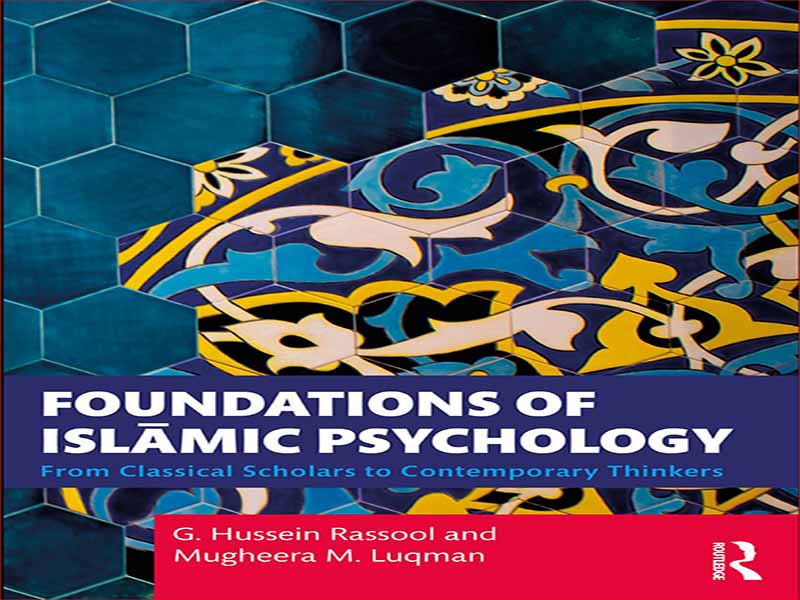- عنوان کتاب: Foundations of Islamic Psychology / From Classical Scholars to Contemporary Thinkers
- نویسنده: G. Hussein Rassool, Mugheera M. Luqman
- حوزه: روانشناسی اسلامی
- سال انتشار: 2022
- تعداد صفحه: 261
- زبان اصلی: انگلیسی
- نوع فایل: pdf
- حجم فایل: 6.86 مگابایت
در دو دهه اخیر، ادبیات روانشناسی اسلامی، روان درمانی و مشاوره در توسعه چارچوب نظری، به کارگیری مداخلات روانی- اجتماعی و معنوی درمانی گسترش یافته است. با این حال، کمبود کتابهای مناسبی برای ردیابی تاریخ روانشناسی اسلامی از دوران طلایی اسلامی تا اوایل قرن بیست و یکم وجود دارد که به دانشجویان و متخصصان نگاهی کامل به ریشههای روانشناسی اسلامی و تحولات کلیدی در تکامل آن، از دانشمندان کلاسیک تا متفکران معاصر ارائه میکند. . میراث اسلام و دستاوردهای علمی-اجتماعی-فرهنگی در دوره ای از تاریخ اسلام که به طور سنتی از قرن هشتم تا قرن سیزدهم باز می گردد، به عنوان عصر طلایی اسلامی شناخته می شود. این دوره واقعاً قابل توجهی در تاریخ بشر با افتتاح بیت الحکمه در بغداد است که یک آکادمی عمومی، مرکز فکری و یک کتابخانه بود. برای قرنهای متمادی، روانشناسی توسط یونان باستان شکل میگرفت تا اینکه روانشناسی جدید اسلامی پدیدار شد. ظهور «روانشناسی اسلامی» نتیجه انگیزه دینی مسلمانان، جستجوی دانش و عوامل سیاسی-اجتماعی بود. در دوران اوج تمدن اسلامی، علمای اسلامی در مورد روانپزشکی، روانشناسی، روان درمانی و ارتباط آنها با سلامت کلی روحی، روانی و جسمانی بحث می کردند. چندین اثر اولیه از دانشمندان اسلامی وجود دارد که به آنچه امروزه به عنوان روانشناسی اسلامی شناخته میشود، کمک کردهاند، که در عربی به عنوان علم النفس شناخته میشود که به معنای «علم نفس یا روان» است. اگرچه روانشناسی اسلامی تا حدودی بر ویژگی یونانیها یعنی نگاه کردن به فلسفه، روح و ذهن با هم تأثیر گذاشت، اما دانشمندان اسلامی نیز شروع به توسعه رویکرد عملی به روانشناسی کردند. راهبردهای مداخله ای در روان درمانی، رفتار درمانی شناختی، شرطی سازی کلاسیک، محیط درمانی و موسیقی درمانی برای درمان بیماران مبتلا به مسائل روانی-اجتماعی ایجاد و مورد استفاده قرار گرفت. درک ریشه ها و مشارکت های تاریخی مطالعه روان شناسی اسلامی، جهت گیری را ارائه می دهد که روانشناسی اسلامی از کجا آمده است، وضعیت فعلی آن چیست و به کجا می رود.
In the last two decades there has been an expansion of the literature on Islāmic psychology, psychotherapy, and counselling in the development of theoretical framework, application of therapeutic psychosocial and spiritual interventions. However, there is a dearth of suitable books tracing the history of Islāmic psychology from the Islāmic Golden Age through the early 21st century, providing students and professionals a thorough look into Islāmic psychology’s origins and key developments in its evolution, from classical scholars to contemporary thinkers. Islām’s heritage and socio-cultural-scientific achievements in a period in the history of Islām, traditionally dated from the 8th century to the 13th century is known as the Islāmic Golden Age. This is a truly remarkable period in human history with the inauguration of the House of Wisdom (Bait-al-Hikmah) in Baghdad, which was a public academy, intellectual centre, and a library. For many centuries, psychology was shaped by ancient Greek, until a new Islāmic psychology emerged. The emergence of “Islāmic psychology” was a result Muslim religious motivation, the quest for knowledge, and the socio-political factors. During the height of Islāmic civilisation, Islāmic scholars were discussing psychiatry, psychology, psychotherapy, and their connection to holistic spiritual, mental, and physical health. There are several early works of Islāmic scholars that have contributed to what is now known as Islāmic psychology, identified in Arabic as Ilm al-Nafs, which means the “science of the self or psyche.” Although Islāmic psychology had some influence on the Hellenic trait of looking at philosophy, spirit, and mind together, the Islāmic scholars also started to develop a practical approach to psychology. Intervention strategies in psychotherapy, cognitive behaviour therapy, classical conditioning, environmental therapy, and music therapy were developed and used to treat patients with psychosocial issues. An understanding of the origins and historical contributions of the study of Islāmic psychology would provide an orientation of where Islāmic psychology came from, what is its present status quo, and where it is going.
این کتاب را میتوانید بصورت رایگان از لینک زیر دانلود نمایید.
Download: Foundations of Islamic Psychology



































نظرات کاربران